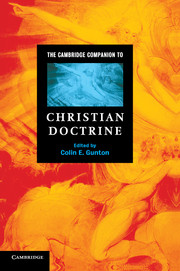Book contents
- Frontmatter
- Part one Christian doctrine in the late twentieth century
- 1 Historical and systematic theology
- 2 On doctrine and ethics
- 3 The basis and authority of doctrine
- 4 The scope of hermeneutics
- 5 Christ and the cultures: The Jewish people and Christian theology
- 6 Christ and the cultures: Christianity and the arts
- Part two The content of Christian doctrine
- 7 The triune God
- 8 The doctrine of creation
- 9 Human being, individual and social
- 10 Redemption and fall
- 11 The church and the sacraments
- 12 Eschatology
- 13 Jesus Christ
- 14 The Holy Spirit
- General index
- Index of biblical references
8 - The doctrine of creation
Published online by Cambridge University Press: 28 May 2006
- Frontmatter
- Part one Christian doctrine in the late twentieth century
- 1 Historical and systematic theology
- 2 On doctrine and ethics
- 3 The basis and authority of doctrine
- 4 The scope of hermeneutics
- 5 Christ and the cultures: The Jewish people and Christian theology
- 6 Christ and the cultures: Christianity and the arts
- Part two The content of Christian doctrine
- 7 The triune God
- 8 The doctrine of creation
- 9 Human being, individual and social
- 10 Redemption and fall
- 11 The church and the sacraments
- 12 Eschatology
- 13 Jesus Christ
- 14 The Holy Spirit
- General index
- Index of biblical references
Summary
THE DOCTRINE OF CREATION
All cultures, ancient and modern alike, seek for a way of accounting for the universe that will give their lives coherence and meaning. Creation theology, in the broadest sense of an enquiry into the divinity or divinities that shape or make our world, is a universal human concern, however different the forms that it can take. But among all the theologies, myths and theories, Christian theology is distinctive in the form and content of its teaching. It is credal in form, and this shows that the doctrine of creation is not something self-evident or the discovery of disinterested reason, but part of the fabric of the Christian response to revelation. 'I believe in God the Father, maker of Heaven and Earth.' Here the word 'maker' is understood in a particular sense. As it stands, it is ambiguous. It may refer to one who is like a human maker, a potter for example, who makes an object out of a material that is already to hand. But Christian theology has rejected that sense as inadequate. The unique contribution to thought made by Christian theologians of creation lies in their development of a view that God creates 'out of nothing'. This became possible by virtue of the trinitarian form of the doctrine. When in the late second century Irenaeus taught that God the Father created by means of his 'two hands', the Son and the Spirit, he was able to complete one stage in a process of intellectual development during which the implications of the Christian form of creation belief were drawn out.
- Type
- Chapter
- Information
- The Cambridge Companion to Christian Doctrine , pp. 141 - 157Publisher: Cambridge University PressPrint publication year: 1997
- 6
- Cited by

